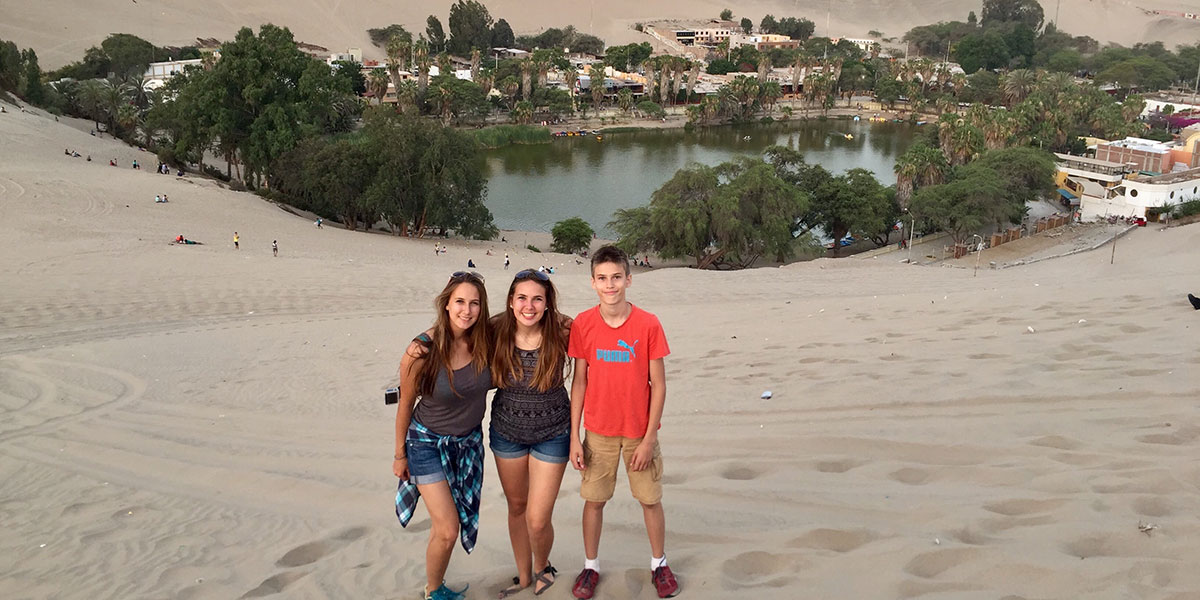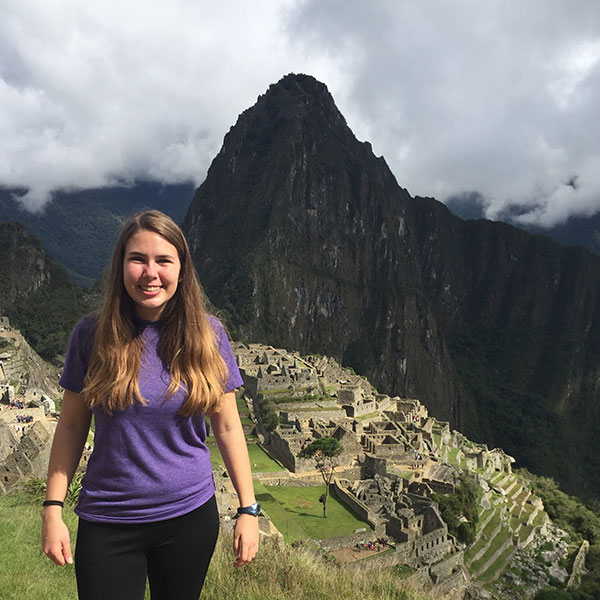Tanya Drochner explains going home from the perspective of an international student, whose home is nearly 4,000 miles away from St. Louis..
 Photos courtesy of Tanya Drochner
Photos courtesy of Tanya Drochner
__________________________________________________
Each day the number changed and the excitement grew as the days lessened until the awaited trip home. Home can mean familiarity, comfort and, for many college students, a place to take a deep breath and relax. Home is often a safe haven from a dorm room where a hard bed can be traded for a comfy couch and cafeteria food can be replaced with a homemade meal. It is not unusual for college students to count down the days until a much-needed break or a return home but something was much different about this Missouri Baptist University student’s countdown. The countdown note belonged to Tanya Drochner, a junior education major, and her home was more than simply a drive across a few cities or states. Her trip home involved flying across the Pacific Ocean to a different continent. Before attending MBU, Drochner lived in Peru, where her family continues to live. Peru is a country of 32 million located on the coast of South America that claims a portion of the Andes Mountains and the Amazon rainforest and is rich with Latin American culture and traditions. For Drochner, it had been two and a half years since she returned to this country she calls home and experienced this culture she was so familiar with. “I miss my family and friends there. I miss the smell of rainstorms. I miss the noisy streets. I miss fish ceviche for lunch. I miss the pop culture references. I miss the fresh fruit. It’s a lot of little things that combine to create a feeling of home,” Drochner said. “I especially miss knowing what is expected of me and understanding all the unwritten cultural and social rules around me. I missed the Peruvian side of me that hadn’t come out in years.” However, over Christmas break, she had the opportunity to return to Peru and experience the familiarity and comfort of home after over 900 days since she had left. “Not as much had changed in my absence as I was afraid it may have. It still felt the same, even if a few new roads and billboards had sprung up,” said Drochner. “I was so free and comfortable right away, like that feeling when you’ve been on vacation for a week and finally get back home. You tiredly walk into your room, drop your bags off, and take a deep breath, releasing all your exhaustion and tension,” Drochner said. “You’re home and everything is going to be OK. That’s what it felt like to be in Peru again. It was wonderful to see and hear things again that had just been memories for so long. It was so easy to forget that I had to leave again.” For Drochner, going home also meant going to a culture that she had been completely separate from for two and a half years. “For the first two days it was a little strange to wake up in Peru again and I had to get back into the rhythm of things, but I was home from the very first day on,” said Drochner. Peru is a relaxed culture where people put less emphasis on time constraints and schedules and more emphasis on relationship building. Meetings and events are often delayed or last longer than expected in the name of being hospitable and enjoying the time of simply being together, much different than what is normal in the U.S. “I know the Peruvian culture and didn’t feel foreign, and I kept a lot of my Peruvianness with me even in the U.S., so it was easy to pull the rest right back out again. Yes, I am always late for everything, it can’t be helped,” said Drochner, adding the most important part of home, though, is the people who share that home. This was true for Drochner as she reunited with her family. “Being with family again was so easy. I was a little worried, even though I never really admitted it out loud, that they would treat me differently or I would feel left out,” said Drochner. “Even though I had missed a year and half of their lives and didn’t know all the people they would talk about, I still felt a part of the family and things hadn’t really changed.” “They still loved me, still valued my opinion, still wanted to be with me. My sister and I brought back all our inside jokes. My mom and I cooked together again. My brother and I watched more YouTube videos together. And my dad and I still stayed up until 2 a.m. talking. All the important things were the same and I was still a part of the family,” Drochner said. However, she did mention a few adjustments she had to make after being away for so long. “I did forget a few small things at first, like the way that Peruvians lie about directions. … If you ask them how to get somewhere and they have no idea, they’ll just make something up and pretend they know what they’re talking about,” she said. “I got pretty lost on my second day back.” Living abroad causes an individual to grow as a person as well as shaping who they are. The newness of a foreign culture and new people can serve to push someone out of their comfort zone and into a new realm of independence. When Drochner came to the U.S. in 2014 in order to pursue her degree at MBU, this was true in many ways.
“I was looking online and MBU was on a list of Christian universities. I liked their program, so I applied. My admissions counselor was very helpful, especially since I didn’t live in-country,” said Drochner.
The first time Drochner stepped foot on campus she was already enrolled and ready to move in. She did not have a visit her senior year or friends she knew at MBU, she was entering blindly and stepping out in faith.
“I ended up receiving great scholarships and later found out that I even have extended family living nearby, Drochner said. “The entire process of me coming to MBU was ordained by God and that was one of my greatest comforts when leaving home.”
Living by complete faith for God to provide as well as living completely independent from her family in Peru had become normal for Drochner prior to her month in Peru where she could relax and enjoy the company of her family.
“I have grown in almost every area of my life. I had to become responsible for everything right away, from health insurance to making sure I ate every day to balancing my checkbook. Not only did I have to take care of myself, I didn’t have a backup person to fix my problems if I messed up; my parents and I were 5,846 km (3,633 miles) apart,” said Drochner.
“Leaving home also meant I had to figure out who I was as a person away from everything I knew. What did I value because that’s what my parents and culture did, and what did I value for me?” Drochner said. “I’ve learned to be very understanding of others. Many people didn’t know I was from another country and, when I committed a social faux-pas, they just assumed I was mean and rude instead of realizing I really just didn’t know what I was doing.”
Being home meant Drochner could take a deep breath and remember life before she was thrown into complete independence. It was a breath of fresh air before returning to MBU.

But, the spring semester soon came and she packed her bags to return to the states with fond memories to get her through until the next time she hopped on a plane home.
“It was hard to leave again. I was comforted because I knew that most things would still be the same when I came back the next time, but it was difficult because I didn’t know when that next time would be,” Drochner said. “Leaving my friends and family again broke my heart a little, but it was easier this time because I had a life in the U.S. to go back to. I missed my friends here just as much as I had missed my friends in Peru, and that was a new and exciting revelation to me.”
However, in March, two months after Drochner returned to MBU, damaging floods devastated Peru, caused by El Nino conditions that brought 10 times more rain than what is normal there.
The devastation resulted in 70 deaths and hundreds of people losing their home and everything they have.
“The hardest part didn’t come right away. It didn’t come until … I got the news of horrible flooding all over the country. Many of my friends have lost their homes and there are many dead and missing people. Thankfully my family is safe, but it’s breaking my heart to not be there to help,” said Drochner.
Being away is not always easy for this college junior, but she makes the most of each day as she makes MBU her home away from Peru.
“Missing out on big events in my friends’ lives like graduations and funerals is the hardest part about being here, but I know that God has placed me at MBU for a reason and I am making this my home,” Drochner said. “I miss Peru, but I’m not consumed by grief. I live my life here and now and have friends and a job.
“I just happen to check airplane ticket prices a lot more than the average person.”